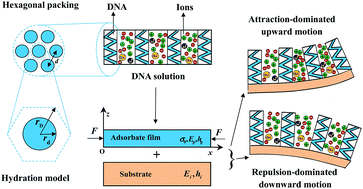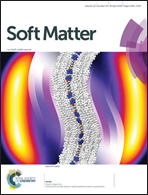The pH-dependent elastic properties of nanoscale DNA films and the resultant bending signals for microcantilever biosensors
Abstract
The diverse mechanical properties of nanoscale DNA films on solid substrates have a close correlation with complex detection signals of micro-/nano-devices. This paper is devoted to formulating several multiscale models to study the effect of pH-dependent ionic inhomogeneity on the graded elastic properties of nanoscale DNA films and the resultant bending deflections of microcantilever biosensors. First, a modified inverse Debye length is introduced to improve the classical Poisson–Boltzmann equation for the electrical potential of DNA films to consider the inhomogeneous effect of hydrogen ions. Second, the graded characteristics of the particle distribution are taken into consideration for an improvement in Parsegian's mesoscopic potential for both attraction-dominated and repulsion-dominated films. Third, by the improved interchain interaction potential and the thought experiment about the compression of a macroscopic continuum DNA bar, we investigate the diversity of the elastic properties of single-stranded DNA (ssDNA) films due to pH variations. The relevant theoretical predictions quantitatively or qualitatively agree well with the relevant DNA experiments on the electrical potential, film thickness, condensation force, elastic modulus, and microcantilever deflections. The competition between attraction and repulsion among the fixed charges and the free ions endows the DNA film with mechanical properties such as a remarkable size effect and a non-monotonic behavior, and a negative elastic modulus is first revealed in the attraction-dominated ssDNA film. There exists a transition between the pH-sensitive parameter interval and the pH-insensitive one for the bending signals of microcantilevers, which is predominated by the initial stress effect in the DNA film.



 Please wait while we load your content...
Please wait while we load your content...